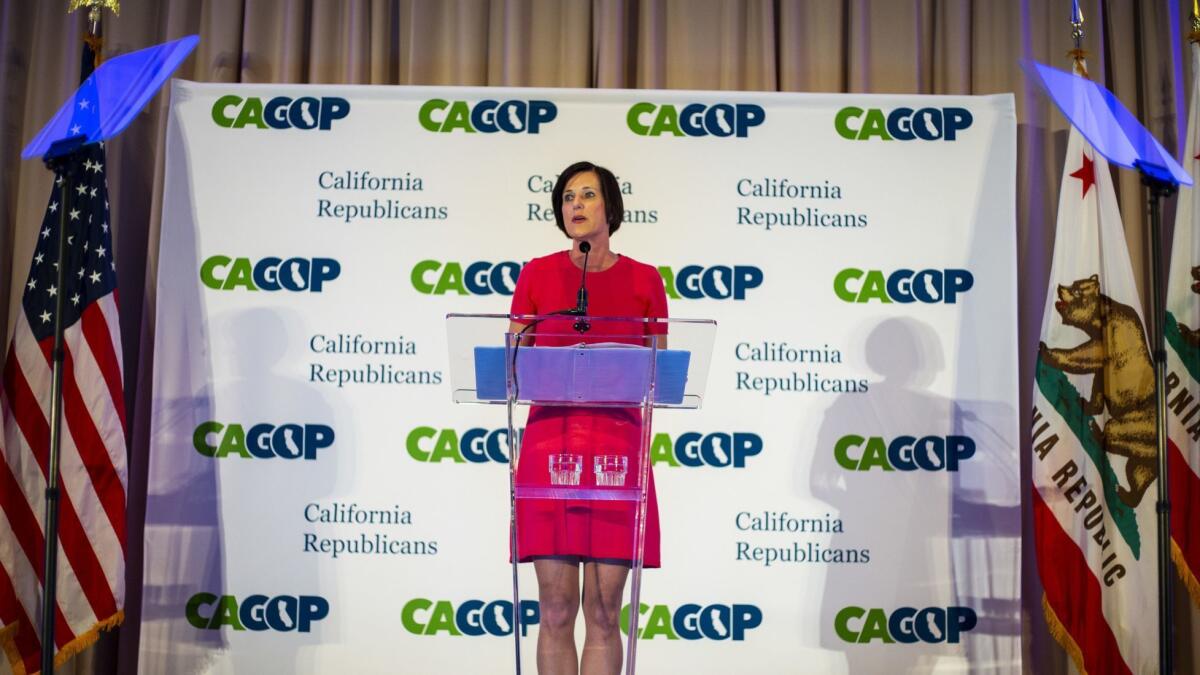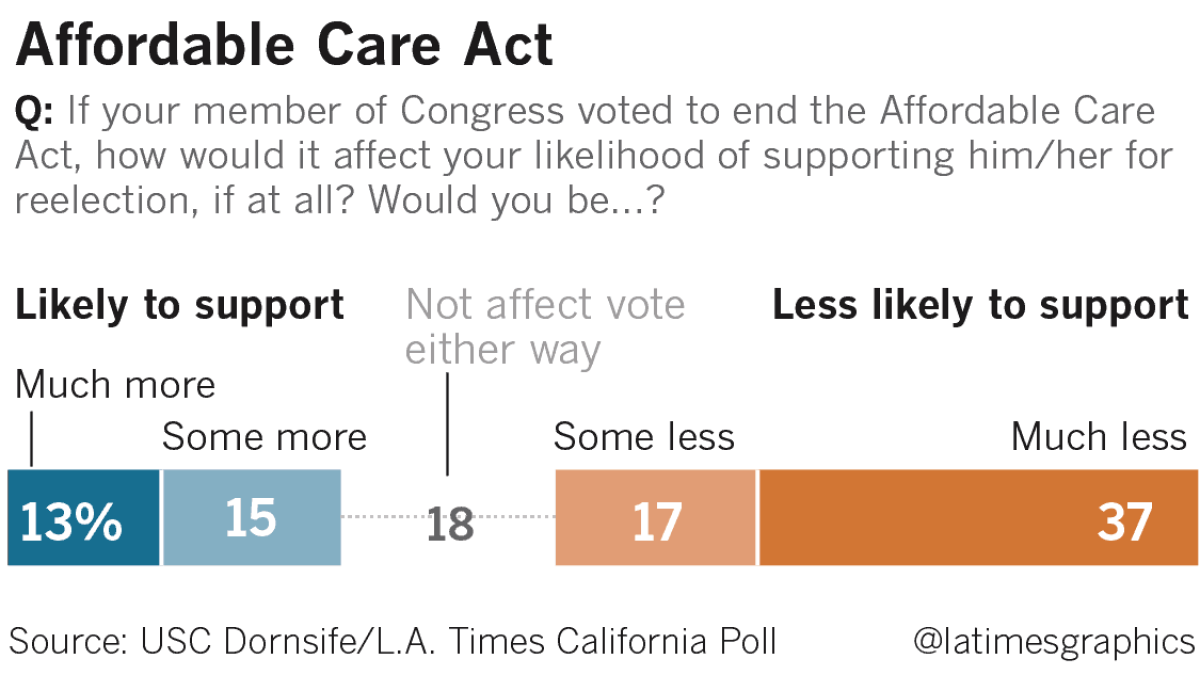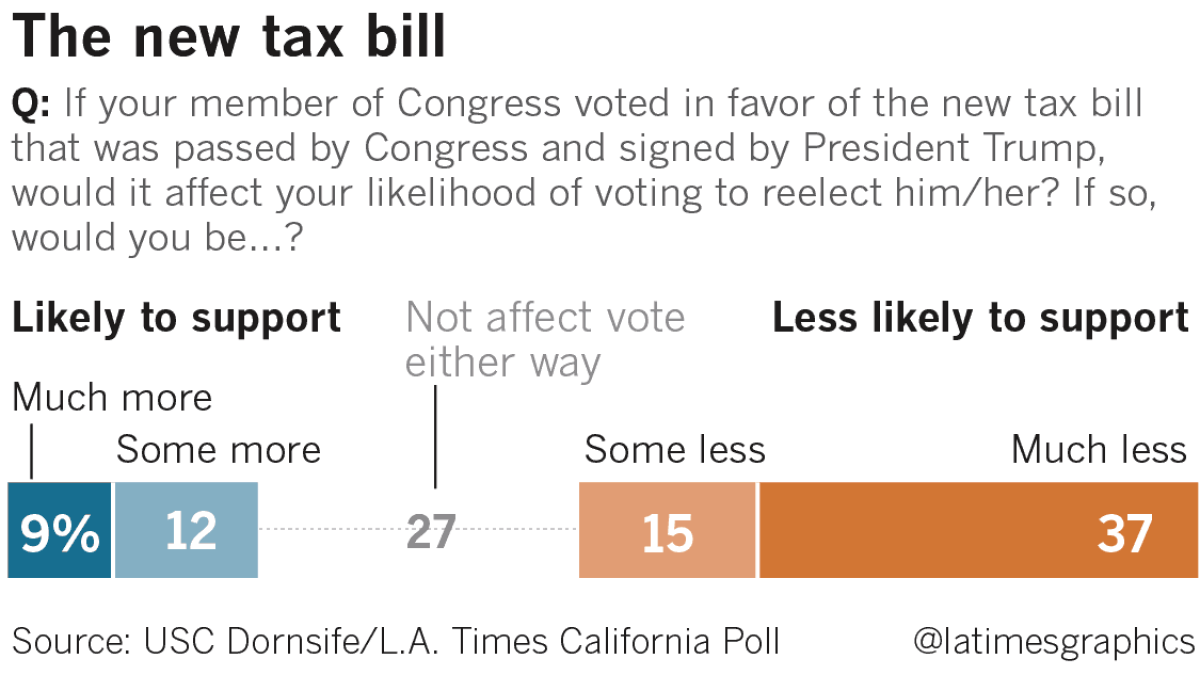Tax bill and Obamacare repeal are potent issues in California congressional races, poll shows

With Democrats angling to win back control of the U.S. House, the new tax law and the failed attempt to repeal Obamacare may prove to be important campaign flashpoints against California Republicans, according to a new USC Dornsife/Los Angeles Times poll.
Sixty percent of registered voters statewide approved of the Affordable Care Act, also known as Obamacare. The support was highest among Democrats and people who disapprove of President Trump, and concentrated in urban and coastal areas — which happen to be regions where there are several competitive congressional races.
A majority of voters, 54%, said they would be less likely to reelect their representative if that member of Congress voted to repeal the healthcare law.

Nearly half of voters, 47%, said they opposed the federal tax overhaul signed by Trump in December. It had support of 27% of voters surveyed, and 26% weren’t sure or had no opinion. A slim majority of voters, 52%, said they would be less likely to vote to reelect their member of Congress if he or she supported the bill.
That could be sobering news for Republican incumbents in California: all 14 of them voted to repeal Obamacare, an effort that eventually failed. Twelve of the GOP lawmakers voted for the tax overhaul and only two voted against it. One of them, Rep. Darrell Issa of Vista, announced he was retiring three weeks later.
“At the federal level, these are very promising issues for Democrats in what looks to be a promising year,” said Bob Shrum, a former Democratic strategist who is now the director of the Jesse M. Unruh Institute of Politics at USC. “I think in vulnerable Republican seats where independents can make a difference, Democrats can and will use [the votes] as levers in the election.”
The poll showed that while support for each issue was highly correlated with party affiliation and support for the president, independent voters tended toward sharing the views of Democrats on both policies. About half of independents said they would be less likely to reelect their member of Congress for voting to repeal Obamacare or supporting the tax bill.
The poll also found a majority of higher income earners and people with college degrees were less likely to support their member of Congress for voting against Obamacare or for the tax plan.
Most of the participants who approved of Trump’s performance as president said they were more likely to support their representative for voting for the tax plan.
Trump’s overall approval was dismal: fewer than 3 in 10 voters were happy with how he’s doing, and nearly 7 in 10 disapproved.
The USC/LAT survey was conducted online from April 18 to May 18 and included 691 registered voters. The overall margin of sampling error is 4 percentage points in either direction.

Democrats have been attempting to use the votes against Republicans the entire campaign season.
The House Majority PAC began running digital ads against Rep. Dana Rohrabacher (R-Costa Mesa) shortly after he voted to pass the healthcare repeal bill. The ads focused on a provision in the bill that would have raised the cap on health insurance premiums for older Americans, who are generally some of the most reliable voters in midterm elections.
Even after the measure failed in dramatic fashion, the super PAC continued to beat the drum, running ads in other California districts to attack GOP Reps. Jeff Denham, David Valadao, and Mimi Walters for their “unforgivable” votes.
Ahead of Valentine’s Day, they transitioned to the tax bill vote, posting a billboard with a box of chocolates along Highway 99 in the Central Valley that declared, “This year, Jeff Denham gave you higher taxes.”
Track the California races that could flip the House »
“From the large scale national view, the path to victory is through economic messages,” said Jeb Fain, a spokesman for House Majority PAC.
Fain said Democrats plan to try to use specifics when attacking Republicans on these issues. In the Central Valley, for example, fears over increasing healthcare premiums for seniors may give people a reason to vote, while college-educated suburbanites might be incensed by the tax bill’s impact on the federal budget deficit, he said. Still others may be concerned about rising premiums due to the tax bill’s elimination of Obamacare’s individual mandate or the cap on deductions for state and local taxes.

For now, many Democratic groups including Fain’s are putting resources toward ensuring their candidates make it through California’s top-two primary, which advances the first and second-place candidates regardless of party. The DCCC and the House Majority PAC have spent a combined $2.2 million so far in three districts where the risk of a shut-out is highest. Expect them to switch gears as soon as the dust settles on the June 5 primary.
Hounding Republicans on a vote they took more than a year ago may be a tougher sell as Democrats transition to the November election, simply because Obamacare was not, in fact, repealed.
The tax law seems like a more poigniant campaign issue since Californians remain deeply skeptical about it. The law is expected to disproportionately impact high-tax, expensive states like California because of caps on the state and local tax and mortgage interest deductions, although much of that won’t be felt until the next tax year — after the midterms.
“Californians specifically are feeling the brunt of much of the Republican agenda on their pocketbooks,” said Drew Godinich, a spokesman for the Democratic Congressional Campaign Committee.
Democrats might be banking on kitchen table issues turning out their voters, but Republicans aren’t waiting around for that to happen. Even before the tax vote, GOP groups were investing in ads to defend the party’s lawmakers. And they are willing to spend millions with control of the House on the line.
Courtney Alexander, a spokeswoman for the American Action Network, called the tax law, known officially as the Tax Cuts and Jobs Act, “the single most important issue in 2018.” The group has run a multitude of ads bolstering California Republicans for supporting the plan.
”Add it up, then thank Congresswoman Walters for cutting our taxes,” one of the ads said.
The group already has spent $30 million nationwide, much of it in California. The Congressional Leadership Fund super PAC, affiliated with American Action Network, is paying for field organizers to get-out-the-vote in several of California’s contested House districts.
Those organizers oversee armies of volunteers who have spent weekend after weekend knocking more than 10 million doors to date nationally.
Coverage of California politics »
The message: Here’s what your Republican member of Congress is doing for you.
On a recent Saturday morning, a field organizer and volunteer rang doorbells and left door hangers in Walters’ 45th Congressional District on a neatly trimmed street in the Orange County suburb of Tustin.
“Will you be supporting Congresswoman Mimi Walters in the midterm election?” one of them asked Mike Zapata when he opened the door.
“I think so,” Zapata, a 45-year-old independent, said. He told the campaigners that lower taxes, jobs and national security were top-of-mind issues for him.
“I have looked at my paycheck, there’s a slight bump. That’s money back in my pocket but I won’t know the full impact until next year,” he said. “I think pro-growth tax policy is important, especially for Orange County residents.”

Alexander cited AAN’s own polling that showed people in the 45th district have a better understanding of the tax law now than they did last year. Nearly half of respondents believed the tax law would increase their taxes in a December survey. In late April, just over a quarter did.
“Members like Mimi Walters are doing a good job of selling it and going home and talking about the tax cuts and talking about what it means for the average family in their district,” Alexander said. “At the end of the day, people want to be able to support their family, they want to have a little extra money.”
Jill Darling, survey director, USC Dornsife Center for Economic and Social Research, contributed to this report.
For more on California politics, follow @cmaiduc.
ALSO
New poll finds a volatile race for second place in California governor’s contest
More to Read
Get the L.A. Times Politics newsletter
Deeply reported insights into legislation, politics and policy from Sacramento, Washington and beyond. In your inbox three times per week.
You may occasionally receive promotional content from the Los Angeles Times.











